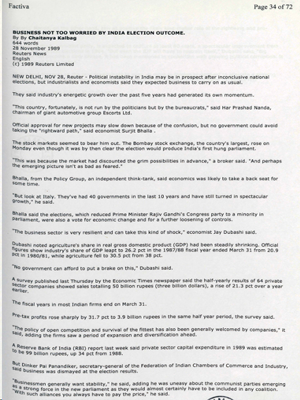BUSINESS NOT TOO WORRIED BY INDIA ELECTION OUTCOME
[Reuters]
Published date: 28th Nov 1989
28 November 1989
Reuters News
English
(c) 1989 Reuters Limited
NEW DELHI, NOV 28, Reuter -Political instability in India may be in prospect after inconclusive national elections, but industrialists and economists said they expected business to carry on as usual.
They said industry’s energetic growth over the past five years had generated its own momentum.
“This country, fortunately, is not run by the politicians but by the. bureaucrats,” said Har Prashad Nanda, chairman of giant automotive group Escorts Ltd.
Official approval for new projects may slow down because of the confusion, but no government could avoid taking the “rightward path,” said economist Surjit Bhalla .
The stock markets seemed to bear him out. The Bombay stock exchange, the country’s largest, rose on Monday even though it was by then clear the election would produce India’s first hung parliament.
“This was because the market had discounted the grim possibilities in advance,” a broker said. “And perhaps the emerging picture isn’t as bad as feared.”
Bhalla, from the Policy Group, an independent think-tank, said economics was likely to take a back seat for some time.
“But look at Italy. They’ve had 40 governments in the last 10 years and have still turned in spectacular growth,” he said.
Bhalla said the elections, which reduced Prime Minister Rajiv Gandhi’s Congress party to a minority in parliament, were also a vote for economic change and for a further loosening of controls.
“The business sector is very resilient and can take this kind of shock,” economist Jay Dubashi said.
Dubashi noted agriculture’s share in real gross domestic product (GDP) had been steadily shrinking. Official figures show industry’s share of GDP leapt to 26.2 pct in the 1987/88 fiscal year ended March 31 from 20.9 Pct in 1980/81, while agriculture fell to 30.5 pct from 38 pct.
“No government can afford to put a brake on this,” Dubashi said.
A Survey published last Thursday by the Economic Times newspaper said the half-yearly results of 64 private sector companies showed sales totalling 50 billion rupees (three billion dollars), a rise of 21.3 pct over a year earlier.
The fiscal years in most Indian firms end on March 31.
Pre-tax profits rose sharply by 31.7 pct to 3.9 billion rupees in the same half year period, the survey said.
“The policy of open competition and survival of the fittest has also been generally welcomed by companies,” it Said, adding the firms saw a period of expansion and diversification ahead.
A Reserve Bank of India (RBI) report last week said private sector capital expenditure in 1989 was estimated to be 99 billion rupees, up 34 pct from 1988.
But Dinker Pai Panandiker secretary-general of the Federation of Indian Chambers of Commerce and Industry said business was dismayed at the election results.
Businessmen generally want stability,” he said, adding he was uneasy about the communist parties emerging as a strong force in the new parliament as they would almost certainly have to be included in any coalition. With such alliances you always have to pay the price,” he said.
Escorts’ Nanda, on the other hand, saw as positive the likely king-maker role of the rightwing and pro-business Bharatiya Janata Party (BJP).
The BJP, a Hindu revivalist party, is expected to capture at least 80 seats, a spectacular improvement from only two in the last elections in 1984. “But even the BJP will have to restrain itself,” Dubashi said. “Big business has become a dirty phrase, it has been mentioned in connection with growing political corruption. It has acquired a bad image.”
Bhalla said pressure on the new government to open up more to foreign investment to alleviate a growing foreign-exchange problem would be immense. “We have to change our neanderthal INTERRUPTED






